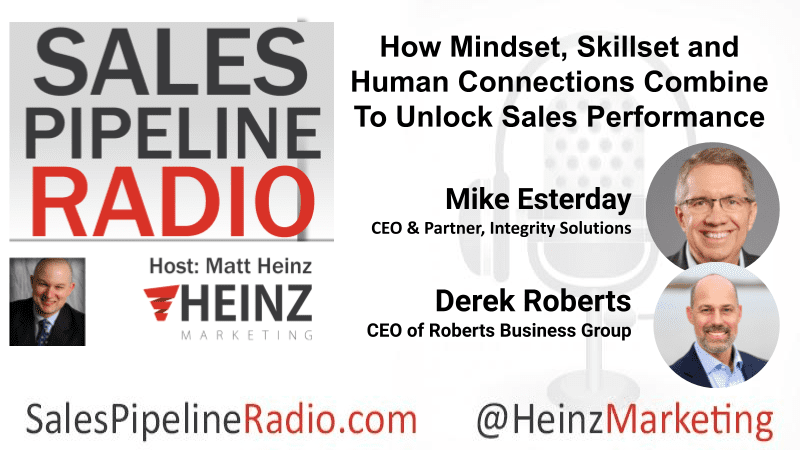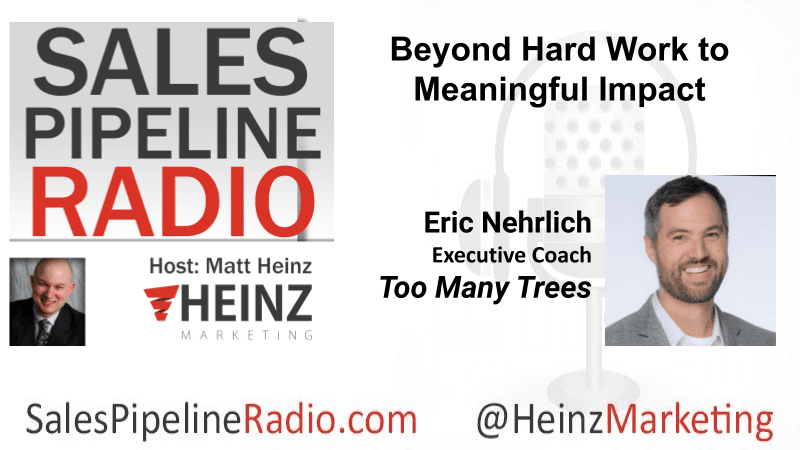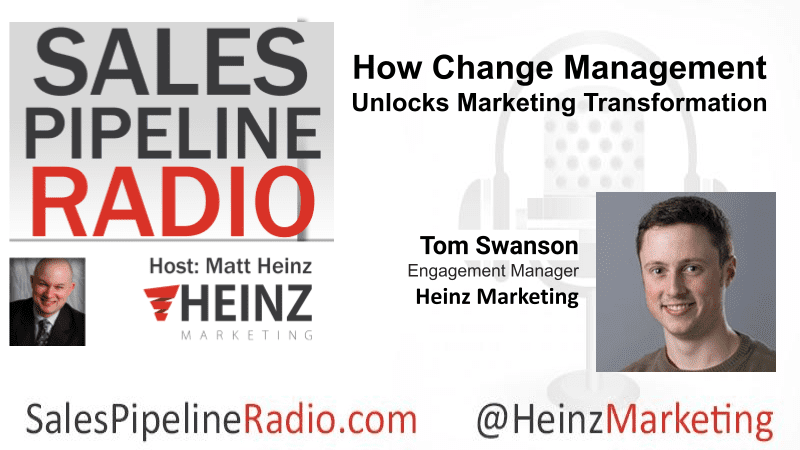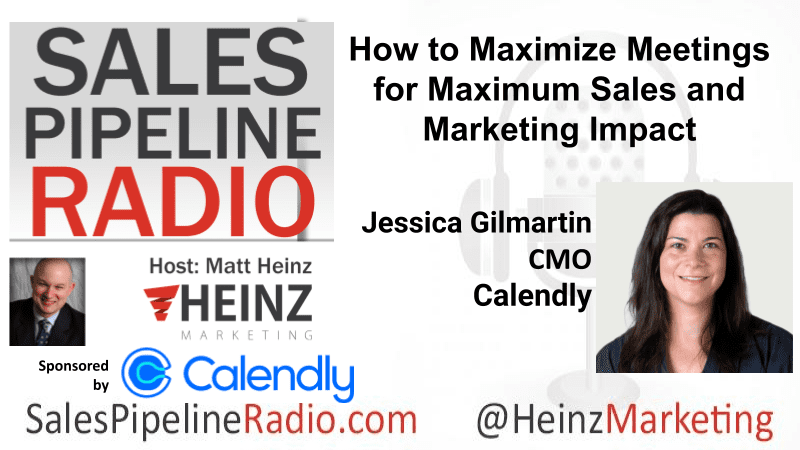Sales Pipeline Radio, Episode 354: Q & A with Mike Esterday & Derek Roberts

Summary
Matt interviews the best and brightest minds in sales and Marketing on Sales Pipeline Radio.
By Matt Heinz, President of Heinz Marketing
If you’re not already subscribed to Sales Pipeline Radio or listening live Thursdays at 11:30 am PT on LinkedIn (also on demand) you can find the transcription and recording here on the blog every Monday morning. The show is less than 30 minutes, fast-paced and full of actionable advice, best practices and more for B2B sales and marketing professionals.
We cover a wide range of topics, with a focus on sales development and inside sales priorities. You can subscribe right at Sales Pipeline Radio and/or listen to full recordings of past shows everywhere you listen to podcasts! Spotify, iTunes, Blubrry, Google Play, iHeartRADIO, Stitcher and now on Amazon music. You can even ask Siri, Alexa and Google or search on Audible!
This week’s show is entitled, “How Mindset, Skillset and Human Connections Combine To Unlock Sales Performance“ and my guests are Mike Esterday, CEO & Partner at Integrity Solutions and Derek Roberts, CEO of Roberts Business Group co-authors of their new book, Listen to Sell: How Your Mindset, Skillset, and Human Connections Unlock Sales Performance
Tune in to Learn About:
- The importance & art of active listening in sales
- The role of preparation in sales, with examples
- The power of validation in sales
- The relationship between emotional intelligence and sales success
Watch the video, listen in below and/or read the transcript below.
Matt: All right. Welcome everybody to another episode of Sales Pipeline Radio.
If you’re watching, listening on demand. Thank you so much for subscribing, for downloading. Every episode past, present, and future is available at salespipelineradio.com. Really excited today to have our guests, Mike Esterday and Derek Roberts, authors of the new book “Listen to Sell“.
I got a copy of this about a month ago and knew I wanted to get you guys on to the show. So first of all, thanks so much for joining.
Derek: Yeah. Thank you for having me.
Mike: Really excited to be here.
Matt: A lot of sales training and a lot of sales books focus on what to say, right? The methodology of what to say, what questions to ask, how to position yourself, how to generate need and urgency. This book’s focused on how to listen and so I want to get the backstory of where this came from, why this topic. It seems to me that there is a vacuum of content that is focused on the fact that we have two ears and one mouth and usually should act accordingly.
Derek: You’d expect that to be true, right? It’s, it seems so simple, and it seems that this is the kind of thing that you get taught by your parents how to interact with people. And then we forget that when we learn so much, we get smart, right? We want to tell people and convince people and persuade people.
But I think you listen people into persuasion rather than necessarily talking them into it. And there’s an art to it. We thought that there was an opportunity to speak to the market and share some things we’ve learned over Mike, what 50 plus years of doing this.
Matt: Yeah, Mike, I saw you perk up and laugh when I mentioned two years in one mouth. But I think sometimes we feel like we’re going to connect with people by sharing what we have to say. Oftentimes, if we just shut up and let the other person talk, hear what they want to… not only do we get smarter about them, but they feel like they’re sharing, they feel like they’re connecting. It becomes a win-win. We just got to have the patience and discipline to do that, right?
Mike: We do. When we get with the prospect, sometimes the more nervous, we are, or we fall into a default of talking. It’s like, we can talk people into buying instead of listening to buy. A lot of that comes back to pre-call planning.
Are we planning out what kind of questions and trying to put ourselves in the customer’s viewpoint, the customer’s shoes, instead of just walking in, trying to sell stuff in the book we talk about not just the skill set of selling, but also the mindset and listening is a mindset too, that I’m going in, not just to talk, but I’m trying to listen, not just to the words, but to the body language, to the intent in between the words to figure out what’s really going on in that customer’s head.
Matt: When we used to do in person sales calls more often, which obviously are back and still happen. And someone taught me once, you know, you look at the four walls of someone’s office and you can learn a lot about what they care about. You’ve got a lot of evidence of things to ask questions about.
We’re not always in people’s offices as much as we used to, to your point Mike, digitally, how do you do that? How do you listen with your eyes and be able to ask better questions and create better connections?
Mike: I think a lot of it is the kind of questions you ask and the mindset I have going in what do you view selling as do I view selling as walking in and just talking, telling product knowledge, or am I really trying to get from this customer viewpoint, what are their problems?, where are their challenges?, what are their issues? And people can pick up whether it’s truly a human-to-human interaction, or if I’m just there trying to try to talk you into buying something. Unfortunately, a lot of salespeople we find have a poor view of selling and you can hardly blame them because what do they see in movies?
And everything’s negative. I mean, it’s hard to find a positive image of salespeople in movies. People get bad experiences, and they think, okay, I’ve got to be a talker instead of a listener. But the real power is in that listening. It’s in the pause in between what you say.
Matt: That pause is so important. I’m glad you mentioned that because I think a lot of times the salespeople, really anyone in conversation that’s anxious about making it go well, helping it go well, as the prospect or your customer is answering the question, or as they are sharing, we’re not listening. Cause we’re worried about what we’re going to ask next, right?
And what I have learned over time is that the pause is important. So that you can listen, the pause is important so that the person feels heard and the pause is important so you can take time to think about what you want to ask next. Derek, some of that is the art of active listening and the discipline doing that. Some of that is just knowing your strategy going in. And preparing yourself then mentally to say, here’s how I want this call to go. Here’s the progression I want to follow. It’s kind of like an actor learning the script and being able to focus on acting on stage versus worrying about the lines. Right?
Derek: Yeah. You know, we talk a lot about being entirely present. In fact, one of the first actions of, our sales methodology is Tune the world out. Tune people in. It’s a really simple idea, but what you do is in preparation, you give your mind freedom to be present. How many times in a conversation are we coming up with that next, not just the right response, but how do I keep this engaged? How do I ask the next question? How do I sound interesting?
That is all a function of preparation. You put your notes there, even if you don’t ever refer to them, what you’ve done is you’ve given your mind a track to run on. Now you can be entirely present, and that’s where we really listen, and I think, part of what we wanted to speak to in today’s environment is that human ears can hear things differently than an algorithm can, right, differently than some AI engine can, and this is a human interaction, and we really took a chance to double down on the salesperson.
We really believe that there is value in selling human to human. It starts in being able to listen to all of those things that are being said.
Matt: There may come a day when robots are selling to robots with complex solutions, but I don’t think we’re there yet. And I think we’re not going to be there for a while.
And look, if you want to let the robots do the dirty work and, help aid some of your prospecting of things that are necessary, but are, called necessary evils for a reason, all the more to you and just getting a focus on being better at the human element of selling. Love that.
One of the things I love about this book is that it’s easy to read. It’s easy to read through and I love the coaching corner sections at the end of each chapter. And I want to get to sort of coaching on this in a second. But Mike, I really liked the AID INC. sales process that’s towards the front of the book. Can you talk about that and why that’s so powerful?
Mike: Yeah. We’ve been in business over 50 years, our founder, Ron Willingham was so frustrated years ago that so many people were trying to sell things to him. And he said, let’s flip this around to a customer focused process. So aid Inc is simply a six step pathway, a track to run on about to have a human to human communication, interactions.
A stands for the Approach. How to gain rapport with someone, but it’s the 1st time or the 10th time you talk to him.
I, as the Interview, asking questions, find out problems, wants, needs, challenges.
The D is where you Demonstrate solutions for the needs that you’ve uncovered. The I, we’re doing a little literary license.
There’s a second I stands for a val-I-date. And that’s how you validate and build trust around your company product you’re selling and yourself.
N is Negotiate and C is Close.
So, when you put those together, it’s a simple track people can run on to have a conversation to help uncover needs, and if there is a need, present a solution and ask for the next step.
Matt: I like that approach a lot. The part that stands out to me that I think is missing in an awful lot of sales processes is the validate section. We think that once we get a commitment to change up front and an interest in pursuing a solution, that there’s already a commitment to do it.
And I sometimes liken it to the saying, well, I’m committed to buying a new car, but as soon as I have to sign the paperwork, I start to question everything again. And I start to want to make sure every I is dotted; every T is crossed. And all of a sudden, you’ve got a bunch of yeses, but a soft no can gum up the process.
Sometimes in buying journeys, we think of that as the confirm the decision, right? So talk about Derek, that validation part. Matt Dixon wrote about this in his book, The Jolt Effect, the fear of messing up, right? And it’s an important part of the process to make sure you have what he calls the double thank you.
why is this missing in a lot of sales processes? And how do you put a better focus on it?
Derek: Well, I think it’s missing because quite frankly, we can’t validate for someone. We can provide things that align with what they value. Just trying to convince them and say, well, this is important, or this is worth it. You can’t do that on behalf of somebody else. I run into this with salespeople all the time. They say, teach me to be a better negotiator. Teach me how to get people that to say “yes” Well, that starts all the way back in the interview, right?
Let’s go find out what’s important to them. If you really get to the reasons that they have to even consider making a decision then those are the things that become valid to them. The validate step later on is just affirming Did we address the things that were interesting and important to you?
And if so, then then they make the decisions themselves. They say, yeah, it’s worth it. And the validate step to me is kind of a tipping point. It’s the difference between saying, hey, this solution is viable, right? Yeah, it could work, but there’s no commitment to that, right? You can get a lot of head nods, but you said a lot of “yeses” in fact. It’s viable.
The tipping point is when they go, “and it’s valuable, meaning I’m willing to put some skin in the game for it”. That’s only because they see that it’s worth it to them. It gets missed a lot of times and it goes all the way back to the interview step. And that’s the heart for us, really.
You do that right, you listen well, then the sale kind of takes care of itself.
Matt: That’s right. We have a great question here from someone who’s listening, watching live. Nicholas, thanks so much for submitting this. With an average of five meetings a day for account executives, how can they remember what to say and what not to say?
And this reminds me of one of the chapters you have towards the book around techniques for outstanding preparation. Mike, how would you answer Nicholas And can you talk a little bit about the preparation required to be successful?
Mike: Well, a couple of things. First of all, Matt, the question, what do you need to say?
That’s important, but probably more important is what do I need to ask? If I can think in AID INC, we talked about the first part of the process should be about 80 percent listening and 20 percent talking. Now, the only way you do that is for better preparation. So what’s your pre call plan walking into this?
Now, sometimes if you’re on an inbound, you know, calls that may not be as possible, but for most sales situations– who am I calling on? What do I know about that person? and today tech is so helpful in finding out about organizations, about people. So, is there some way I can have a personal connection and a business connection with this person to get things started to gain rapport?
What kind of questions do I need to ask? What am I really trying to present to them? What’s the next step? Am I clear on what I want the objective to be for this call? So being clear what you say is important, but even more important is the preparation and what you’re going to ask.
Matt: Yeah, I love that. Thank you. And Nicholas, hopefully that answers your question. And thanks again for, for chiming in with a great question. This book is full of best practices for how to be better at listening. The better preparation, having a progression of the questions you’re going to ask. And at the end, it talks a little bit about coaching.
So if I’m no longer on the front lines, if I’m a sales manager, sales coach, sales VP, other than buying everyone a copy of this book, what are some of the best ways to coach people to be better listeners? And Derek, maybe we’ll start with you.
Derek: Well, I think part of it is being present. Too often, sales leaders don’t spend enough time with their sales producers in real conversations.
So, listening to what’s happening and being able to identify and then, and then coach. I think that’s a big piece of it, right? Being attentive and being present.
I think the second thing is understanding sales is not mechanical, right? It’s a dynamic conversation. And so knowing how to do a sales process is important, but more importantly, I think sales leaders need to listen to what are some of the obstacles? I’m seeing patterns, how do I dial in? We actually spend the first third of the book talking about selling happens between the years before it happens between people.
So much of the sales success is what’s going on in that producer’s head. Can the sales coach tap into that? Can they remove some of those barriers? Can they turn on some of the enablers that make them successful?
So we’ve, we’ve tried to address a lot of that in the book. And actually at the end of every chapter of these little coaching corners; give some questions. Mike, I’m sure you probably agree, but have other thoughts?
Mike: Yeah, it’s interesting a lot of managers have been promoted because they’re successful at sales and too often they’re turned into a super rep and do it for their people. Or they tell them what to do instead of teaching them and coaching them. So there’s a difference between managing, leading and coaching people. Too often they’re coaching only to the skill, which is important, but they also need to coach to that mindset.
You understand why that rep is working there. What do they want to make money for? What’s their purpose? What’s their level of belief in the product they’re selling? Is there a sense of passion there? We’re just trying to make a buck? What’s the deal? Because that mindset customers will pick up whether they’re for them, authentically, or they’re just, they’re selling stuff.
Matt: As we wrap up here, the one last thing I want to touch on is this concept of emotional intelligence. I think that some people have more inherent, natural, emotional intelligence than others. But I think this is something that you can practice. I think this is something you can learn. I think this is something you can get better at.
Derek, can you talk about the relationship between high EQ and successful salespeople and what everyone can do, no matter what natural ability they bring to the table, what they can do to improve that important element of not just being successful at selling, but successful being human.
Derek: I think I have to first point towards Dr. Travis Bradbury and in his book, Emotional Habits, developing emotional intelligence habits and working on that. It’s the practice of not just recognizing these are the actions that I have to take, but it’s the self evaluation that comes back to it and says “okay.am I aware of what’s going on? Am I willing to take critical look at my behaviors? Am I willing to ask somebody to look at what I’m doing and then give me guidance? I think truly emotionally intelligent people are willing to have someone look at their swing, so to speak, and give them some counsel and some coaching. I think that’s a big factor in that success.
Matt: It is, absolutely. Well, guys. This has been fantastic. Thank you so much for being part of this. Highly encourage folks to get a copy of this book “Listen to Sell“. Want to learn more about the book https://www.integritysolutions.com/resources/books/.
Derek and Mike, thanks so much for being part of this today. I Really appreciate it.
Derek: Thank you.
Mike: We appreciate it.
Matt: Thanks for being here. Appreciate everyone listening, downloading, subscribing. We will see you next week on another episode of Sales Pipeline Radio. Take care.
Listen to the Latest Episodes:
Matt interviews the best and brightest minds in sales and Marketing. If you would like to be a guest on Sales Pipeline Radio send an email to Sheena@heinzmarketing.com.



